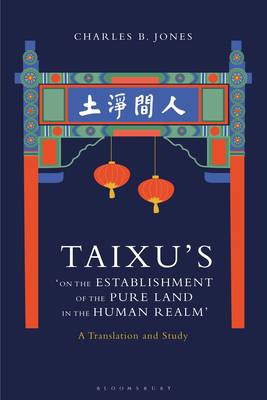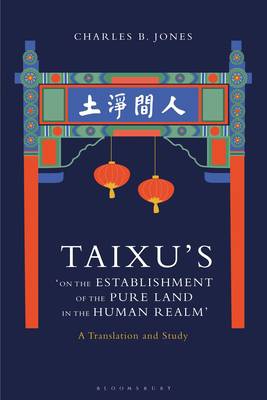
Bedankt voor het vertrouwen het afgelopen jaar! Om jou te bedanken bieden we GRATIS verzending (in België) aan op alles gedurende de hele maand januari.
- Afhalen na 1 uur in een winkel met voorraad
- In januari gratis thuislevering in België
- Ruim aanbod met 7 miljoen producten
Bedankt voor het vertrouwen het afgelopen jaar! Om jou te bedanken bieden we GRATIS verzending (in België) aan op alles gedurende de hele maand januari.
- Afhalen na 1 uur in een winkel met voorraad
- In januari gratis thuislevering in België
- Ruim aanbod met 7 miljoen producten
Zoeken
Taixu's 'on the Establishment of the Pure Land in the Human Realm'
A Translation and Study
Charles B Jones
Paperback | Engels
€ 69,45
+ 138 punten
Omschrijving
In this book, Charles B. Jones provides the first English language translation of one of the most important texts of modern Chinese Buddhism: monk-reformer Taixu's 'On the Establishment of the Pure Land in the Human Realm'. The essay, written in 1926 as part of Taixu's attempt to revive Chinese Buddhism with a Humanistic Buddhist approach, incorporates Western thought into a reconstruction of the idea of the 'Pure Land in the human realm'. In his commentary on the text, Jones argues that it has been widely misunderstood and mischaracterized.
Jones demonstrates that, besides laying out the very modern idea of the Pure Land in the human realm as a slogan for Buddhist engagement with the problems of the modern world, the essay does not, as commonly assumed, discourage practices leading to rebirth in the Pure Land. He also shows that the 'human realm' can mean anywhere in Buddhist cosmology that humans reside, and that the essay's attempts to reconcile Buddhism with modern science is tentative and incomplete. Jones reveals that the essay promotes visions of both paradises and utopias, and that Taixu supports his ideas with many lengthy sutra quotations. The book concludes with an examination of how Taixu's followers developed the idea of the Pure Land in the human realm into a more coherent and modernized ideal.Specificaties
Betrokkenen
- Auteur(s):
- Uitgeverij:
Inhoud
- Aantal bladzijden:
- 168
- Taal:
- Engels
Eigenschappen
- Productcode (EAN):
- 9781350201255
- Verschijningsdatum:
- 28/07/2022
- Uitvoering:
- Paperback
- Formaat:
- Trade paperback (VS)
- Afmetingen:
- 156 mm x 234 mm
- Gewicht:
- 244 g

Alleen bij Standaard Boekhandel
+ 138 punten op je klantenkaart van Standaard Boekhandel
Beoordelingen
We publiceren alleen reviews die voldoen aan de voorwaarden voor reviews. Bekijk onze voorwaarden voor reviews.









